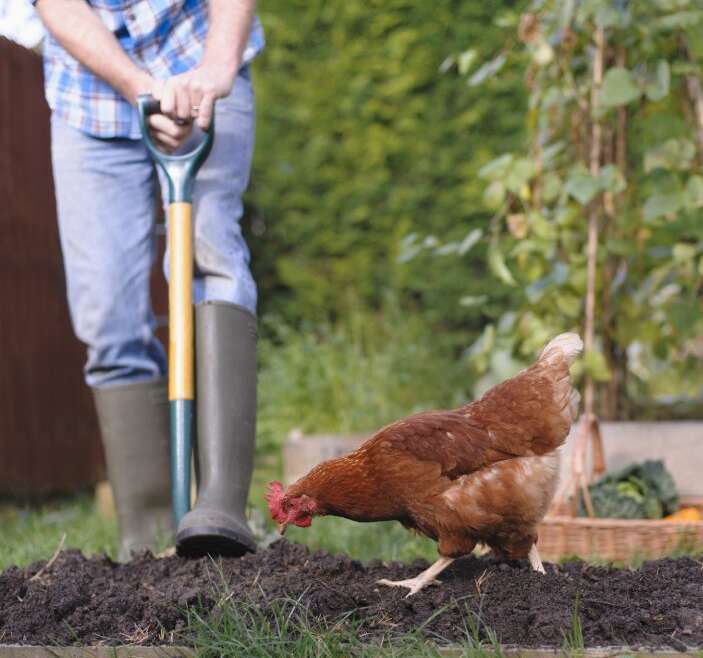What bugs do chickens eat? Luckily for the gardener, they chow down on many of the more invasive and damaging varieties of insects.
In addition to being excellent pets, using chickens for garden pest control allows you to grow without the dangers of pesticides. Keeping backyard garden chickens can be a rewarding pastime with the added bonus of fresh eggs from just outside your door.
Are Chickens Good for Pest Control?
Keeping chickens often necessitates supplementing their diet with a store-bought or DIY chicken feed for optimal nutrition. But the organic garden is rife with other great foodstuffs for chickens.
Chickens are omnivores, meaning they will eat almost anything edible. Foraging in the garden, they will find grasses and other vegetation, seeds, nuts, fruits, vegetables, mice, and other items. They also need a source of protein, and insects and grubs are their preferred choices.
Are chickens good for pest control? Their pecking and scratching, lightning-fast reflexes, and keen eyes help them spot all manner of annoying garden pests. This will keep the pest population down and help save your plants from infestations and feeding damage.
What Bugs Do Chickens Eat?
What kinds of bugs do chickens eat? Some of the more common damaging insects and their young are favorites of chickens. The Japanese and Colorado potato beetle’s young are a delicacy to poultry.
Beetle larvae aren’t their only prey. Chickens will efficiently cut down the population of annoying cabbage worms, who turn vegetable crop leaves into Swiss cheese. They like grasshoppers, hookworms, fleas, ticks, moth and termite larvae, slugs, centipedes, spiders, and even scorpions. Crickets, locusts, and the fly larvae are all on the menu.
What Bugs Can Chickens Not Eat?
Chickens should not eat insects in areas where herbicides and pesticides have been used. Such chemicals can affect their egg production and overall health, as well as taint the meat if the poultry are being raised for food.
Chickens will naturally avoid stinging wasps and bees, although they will eat honey bees. They should also avoid blister beetles who contain cantharidin. This compound is highly toxic and may be fatal when ingested. Box elder bugs and multicolored Asian lady beetles also seem to be avoided by poultry. Certain house flies can transmit chicken tapeworms.
How to Use Chickens for Pest Control
Chickens should be “trained.” This will prevent them from eating your produce and leaving manure everywhere. Training starts when they are young by allowing them to only feed along the perimeter of the yard. They will eat any bad insects that come into the property. Alternatively, chickens can be allowed to free range. But be aware, they will scratch up lawn turf as they search for prey and eat desired plants. Use a chicken tractor or fencing to keep chickens out of garden beds.
Best Chickens for Pest Control
Many breeds of chicken are ideal for controlling unwanted insects.
- Brown leghorns are a beautiful breed that lays large white eggs and has a voracious appetite for insects.
- Andalusians hunt grubs and other pests and also lay large white eggs.
- Hamburg chickens are extremely hardy and tenaciously chase down bugs, while friendly
- Dominiques make excellent pests and foragers.
- Other good pest control chickens are Plymouth Rock hens, Malay, New Hampshire, Cubalaya, Ameraucana, Cochins, and Orpingtons. Red Rangers were literally bred to hunt out insects and make award winning table fowl.
If you are looking for mouse control, Buckeyes have an affinity as mousers that has been compared to a cat’s abilities.
Frequently Asked Questions
Is It Okay for Chickens to Eat Bugs?
Without insects, chickens will need their diet supplemented with chicken chow. Almost all insects are nutritious and safe for chickens. They will avoid those that taste bad or sting. So it’s more than okay for chickens to eat bugs, which is a natural part of their diet.
What Bugs Do Chickens Eat the Most?
Many of the breeds seem to favor grubs and larvae. Flying and crawling insects are also favored, but they often hunt by scratching and pecking the ground where they find pests that live in the soil.
Other Fowl for Pest Control
Many gardeners find chicken scratching too damaging for their gardens and instead rely upon ducks. Ducks will eat a variety of insects but do not scratch at the soil and they are more trainable than chickens. Guinea fowl are noted as superior insect eaters. They are recommended for areas where ticks are of concern.



